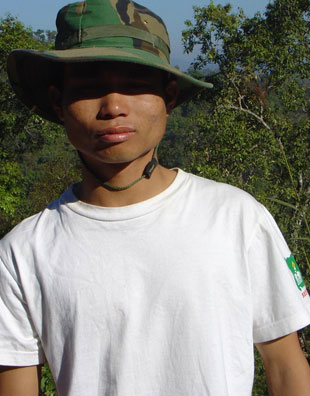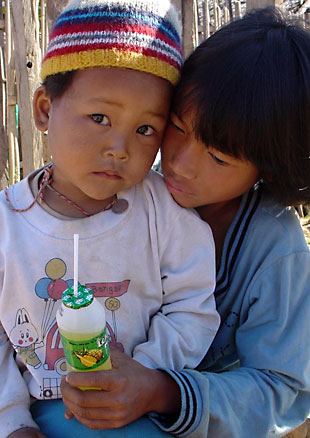Sai Liang lost everything when his village was burned and his family murdered by the SPDC. He lived on the streets and drank alcohol daily. Unable to care for his younger brother, he was forced to abandon him at a temple. Eventually, Sai Leng made his way to Loi Tailang, where he completed high school and SSSNY college. Now, he is a school teacher, and cares for orphans at Loi Tailang, so that they won’t have to suffer as he did. His story is an inspiration, a testament to the indomitable spirit of man.
Twenty-two year old Sai Liang came to Loi Tailang in 1999.
“Inside our Shan State there are many problems.” Began Sai Liang trying to explain why we were sitting on an army base, which has come to be seen as an island of Shan culture. “The SPDC burned down our village and forced the villagers to go live in the city. They gave us three days notice, but how could we move?”
The family was of course, farmers. They couldn’t move their rice fields.
“We couldn’t take our animals. When the SPDC came, they took our animals and killed them.”
“Anyone who didn’t leave the village or who didn’t move quickly enough would be shot.”
Sai Liang’s family left on the third day because they had to pack their whole lives, and carry them away.
“We had to walk very far, carrying some food and rice.”
“Young people could walk it in one day, but children and old people needed three to five days. Some people died on the way. They died of hunger or got sick, and collapsed at the side of the road. It was mostly old people and children who died.”
More than one thousand people from Sai Leng’s village arrived in the city and had to find someplace to sleep. They built makeshift huts.
“We had no water, no bathroom, nothing.”
Worst of all, they had no food.
“Life was difficult for us. People got sick, and more people died after we got to the city.”

“We didn’t have money or food, so we wanted to leave the city, but SPDC told us we couldn’t leave. We had to leave secretly, at night.”
Sai Leng’s family consisted of himself, his parents, an older sister and a younger brother. They left the city and headed into the jungle to find food.
“We were in the jungle for about a month. There were other displaced families there too, so we shared food. Some of them had never even gone into the city. They went straight to the jungle. In the jungle, we had to find food in the trees. We also planted crops. We were so hungry. Sometimes we had to go in the village or go to the neighbors and beg for food.”
The SSA is always careful to refer to Shan Nationalities, meaning that all ethnic groups will get the same treatment inside of Shan State.
“Some people were Shan, Palaung, Lisu or other tribes.”
In the Shan State the Tai (Shan) ethnic group is the largest. But other tribes, Lisu, Lahu, Pa-O, and Palaung also call Shan State home. The tribes speak different languages, have different cultures and religions, but what they have in common is a hatred of the SPDC. The Burmese government has been terrorizing all of the tribes, so the tribes have been shelving any issues they had with each other to combine against the government.
“In the morning I went into the jungle to shoot birds with the catapult. I heard gunshots back in the village. I was very frightened, so I ran away and hid. After an hour I went back to the village and saw many people were dead, including my father. He was shot trough the back, and the bullet came out the front. I saw an old man from my village. His head was hanging from a tree. I was very afraid. Then I saw my mother lying on the ground, shot and bleeding.”
“I asked some help from another villager, and we took her to the city, but I had no money to help my mother. I brought her to the temple and asked the monks to help her. You know in Shan culture we believe in magic and Buddhism. The monks just gave her some holly water. They said some prayers, but she died.”
“I went to the city with my sister and younger brother we stayed fifteen days, but then we had to leave because we had no food. My little brother was only five years old, so we left him at a temple.”
Sai Leng and his fifteen year old sister went back to the jungle with the Palong tribe and planted rice.
The SPDC came to the new village, in the jungle, burned all the tents and killed all the animals.
“Behind a hut, I found my sister’s body in a pool of blood.”
“I went back to the city. My younger brother asked, where is our sister? I lied to him. I said she was fine. She is growing food for us, then we can all be together again.”
Sai Leng looked very emotional. “I could not tell him the truth.”

“I cared for my brother during the day, but after he fell asleep, I went out and drank alcohol. I drank every night.”
Sai Leng was only ten years old.
“Everything was gone. I stayed out drinking all night, wandering around the city. When I came back in the morning, my brother said to me why do you do this? I said, I am the older brother. You are young, you don’t know anything.”
“One of Col. Yawd Serk’s soldiers came to the city and told me we have a school and we have food and water. You can come with us. When you grow up you can be a soldier. It took months to walk to Loin Tailing. Sometimes, I was tired and the soldiers let me ride a horse. They were very kind to me. It took five months sneaking through the jungle because we had to avoid SPDC.”
“When I arrived at Loi Tailang, I couldn’t write Shan language, because inside Burma it is illegal to teach Shan writing.”
“The first day of school the teacher asked me to stand up and name as many countries as I could. I told him, there are only two, Shan and Burma. The teacher told me there were many, but I didn’t believe him.” Sai Leng laughs, signaling that this was the point where his life took a turn for the better.
He went to Thailand to be a monk. “English classes were hard for me, but learning Thai was easy because it is similar to Shan language.”
“At Loi Tailing, at first we didn’t have a school, just thirty students and one teacher. We had classes in the temple. We didn’t even have monks.”
Today at Loi Tailang there are two schools, a pagoda with 15 monks, and nearly one thousand students.
Sai Liang finished high school in Loi Tailing and was chosen to attend the School for Shan State Nationalities Youth, a nine month intensive program where the brightest young people from Shan State learn English, social studies, and politics.
Now, Sai Liang is a teacher at the school in Loi Tailang. He lives beside the dormitory for the orphan boys, serving as their big brother and caring for them.
He smiles an infectious smile, the satisfaction of someone who has overcome great adversity. “I am very happy now because I have a chance to teach our children, like my teachers taught me.”
“So, your story has a happy ending?” I asked.
“Yes, it is a happy ending.”
Asked what message he would like to send to the world, Sai Liang said,
“I ask the world to put pressure on Burma to get democracy and give us independence, and for all ethnic groups to be equal. I want all people around the world to support democracy and human rights in Burma. I want all foreigners in USA, Russia, and the whole world to learn how difficult is the life for people of Burma and how many have to escape to Thailand. It is very important that every country supports human rights and democracy in Burma.”
Loi Tailang needs volunteer teachers, doctors, and journalists. Please volunteer. And please say a prayer for Burma.
Read Ethical Traveler's Reprint Policy.
